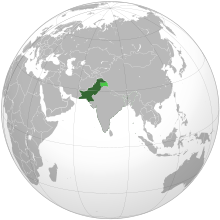Pakistan’s Military: Infiltration By The Hizbut Tahrir? – Analysis
By IPCS
By Rana Banerji
Recent disclosures in the Pakistani media indicate that the penetration of Hizbut Tahrir (HuT) within Pakistani Defence services may be more extensive than hitherto believed. In August 2012, a Military Tribunal convicted Brig Ali Khan, who belonged to a military family and four others- Majors Sohail Akbar, Jawad Basher, Inayat Aziz and Iftikhar to rigorous imprisonment terms ranging from five years to eighteen months- for having planned, sometime in 2011, to usurp power through aerial attacks against the military and civilian leaderships, on way to establishing an `Islamic caliphate’. This was apparently HuT’s third attempt to infiltrate in the last decade.
Hizbut Tahir’s Earlier Attempts to Infiltrate

An attempt was made to suborn 13 Special Services Group commandos in 2003. In 2009, a number of mid-ranking officers – lieutenant Colonels/Colonels were approached. In the last two cases, the same set of HuT activists were involved- one Abdul Qadir, a `Dr Ahmed’ and Rizwan. They used the same modus operandi – first talent spotting sympathetic officers through friends and relatives before proposing specific plans. After Brig Ali Khan was motivated, he revealed his plan to three other Brigadiers – Naeem Sadiq, Muhd Amin and Aamir Riaz, before being nabbed, significantly just four days after the 2 May 2011 taking out of Osama bin laden by American commandos in Abbotabad.
Founded in Jerusalem by Taqiuddin al Nabhani in 1953, it developed a sizable following in Lebanon. The HuT professes to establish an Islamic caliphate through non-violent methods. It is against killing of civilians. Pakistani adherents were noticed in its British branch during the mid-‘90s, also in its breakaway faction,`Al Mohajiroun’-led by Omar Bakri Mohd. It came to unpleasant notice in Pakistan first in 2003, though no direct involvement could be found in two abortive assassination attempts against Gen Musharraf then or with the attack on the Karachi Corps Commander. Cells of other islamist groups were purged within the Air Force, not with complete success.
Subsequently, the HuT was banned but this ban had to be lifted after a successful legal challenge in Lahore High Court in 2004. Though having a distinct Middle Eastern/ Central Asian flavour, the HuT seems to have slowly but surely spread its tentacles inside Pakistan. Its cadres, many of them returnees from UK, were mainly based in Punjab and Khyber Pakhtunkhwa (KP). HuT in Pakistan is believed to have established contacts with Tahir Yuldashev’s Islamic Movement of Uzbekistan (IMU), when the latter was offered refuge by al Qaeda inside the Federally Administered Tribal areas (FATA) after 9/11. Pakistani analysts believe HuT may have been influenced by IMU to use violence as a short term tactic to further its goals.
After the Brig Ali Khan module was busted, Military Intelligence (MI) and Inter Services Intelligence (ISI) teams cracked down on suspected HuT cadres in Punjab and KP. Some of its prominent leaders were picked up – Imran Yousafzai (currently, its spokesperson), Hayan Dawar Khan, Osama Hanif, Dr Abdul Qayum and Dr Wahid – their relative filed habeas corpus petitions against their sudden `disappearance’ – this forced the authorities to release them in a phased manner subsequently, though their cases have now come up before the Commission of Enquiry on Forced Disappearances, set up by the Supreme court in Aug 2012.
The failure of Brig Ali Khan’s plot has demonstrated yet again that ` bottom up’ coups do not work in Pakistan, this being the fourth such failure after the Rawalpindi Conspiracy Case of 1951, the Attock Trials of 1972-73 and the Zaheer ul Islam Abbasi coup attempt of September 1995. However, this is the second palpable instance of Islamic ideological motivation stirring ambitions at fairly senior echelons. This must be disconcerting for the current cohort of senior Generals, who were the last group of officers who benefited from training overseas, in the West and exposure to wider external influences of a somewhat ‘liberal’ kind.
In the 1979-87 period, the so-called ‘Zia Bharti’ years, the intake of officers shifted to more conservative urban areas of southern Punjab from the traditional recruiting heartland of ‘Potohar’. These recruits may have been affected by Zia’s Islamic ethos and official fostering of religious ideology and dogma in Army training institutions. Though subsequently, ‘cleansed through careful screening in the Army’s senior Selection Board for promotion from Brigadiers upwards to two and three Star Generals, under both Musharraf and now Kayani, the possibility of someone who cleverly conceals his Islamic predilections getting through cannot be completely ruled out. Such a General would still have to contend with the wisdom of collegiate leadership.
Recent practical experience in counter insurgency operations in FATA and Swat shows that the Army leadership resorts to necessary and sufficient force to ‘cleanse and hold’ but only after careful deliberation. The emphasis is on quiet and limited action to bring recalcitrant militants to book. Incidents like the Brig Ali Khan trial indicate that Kayani’s refreshing Kakul rhetoric, and post-Malala civil society consternation notwithstanding, this is likely to remain the guiding norm of Army’s manoeuvres in this region till the withdrawal of the US forces from Afghanistan.
Rana Banerji
Distinguished Fellow, IPCS
email: [email protected]

Both the govt/military/ and the people of Pakistan have never really followed the divine teachings of the Quran or followed into the footsteps of the Prophet.Majority have practiced rituals without understanding.Look at the difference next door Islamic Iran,has practiced both religion and science.Pakistani needs a total Islamic revolution.